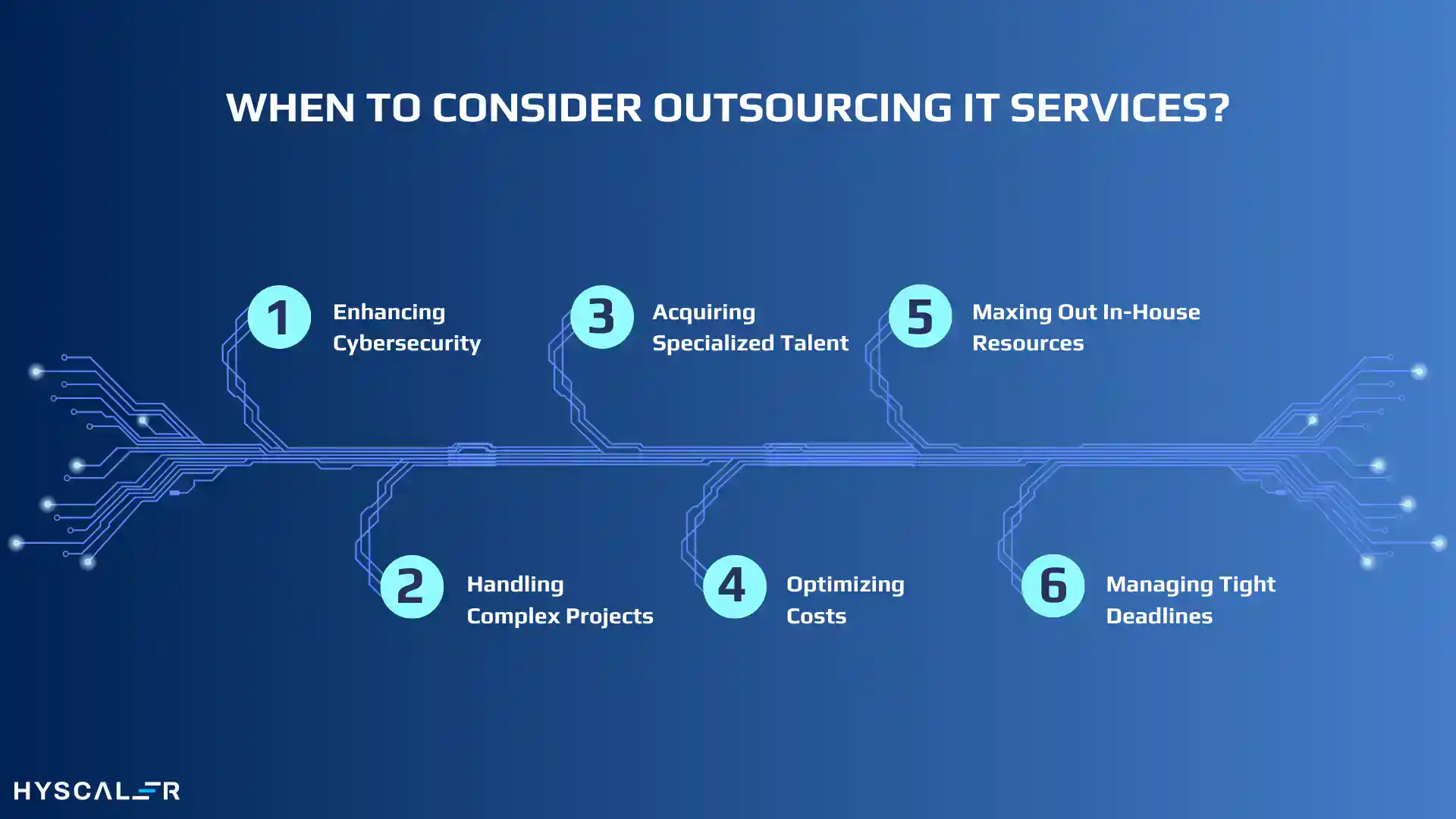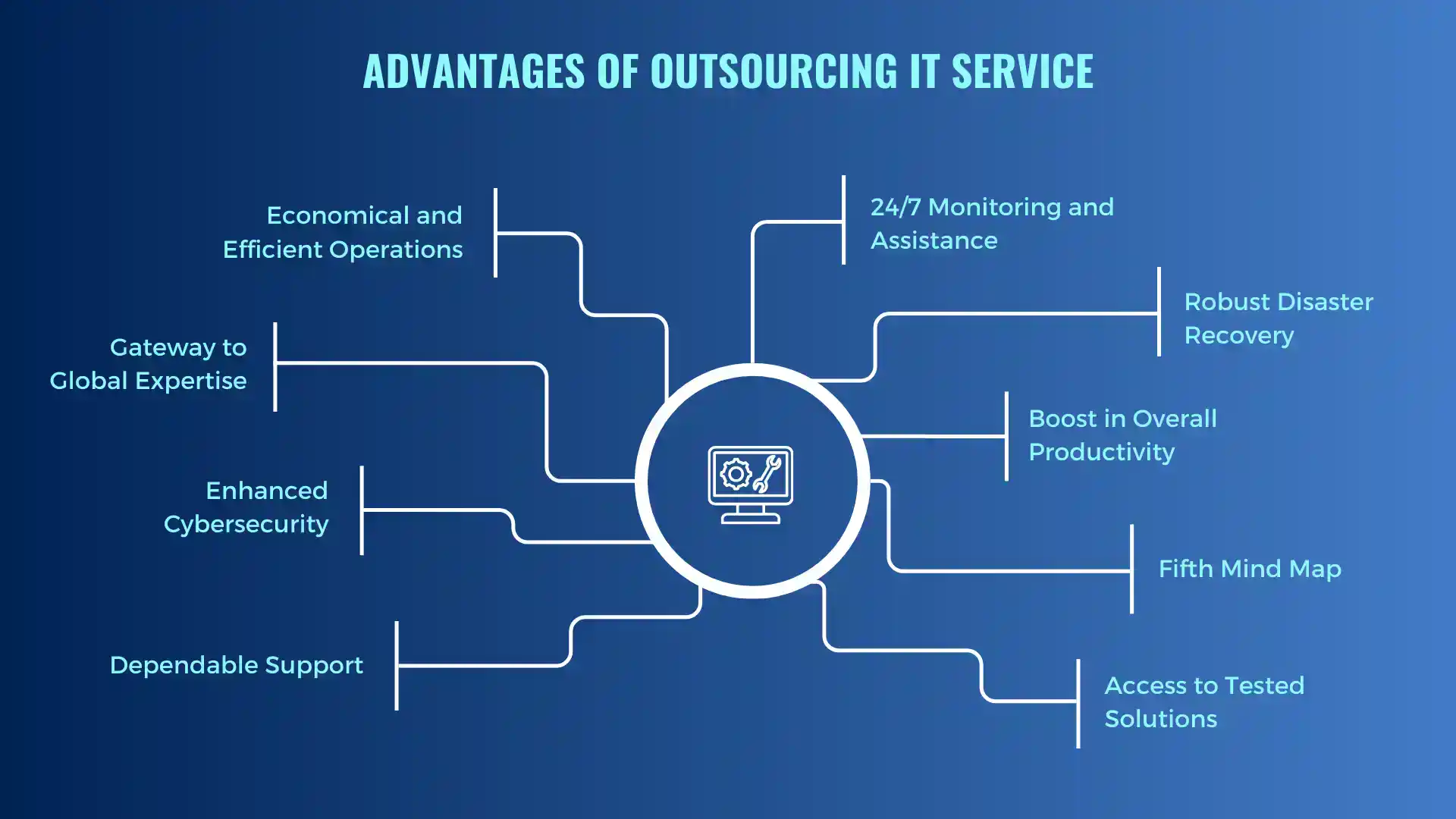In today’s fast-paced digital era, businesses are often faced with the crucial decision of how best to manage their IT infrastructure. Two prevalent options emerge: Fully Outsourced IT and Co-Managed IT. Both models offer distinct advantages, depending on an organization’s needs and existing resources.
Table of Contents
Outsourced IT vs Co-managed IT

Fully Outsourced IT Service: A Comprehensive Solution
When a company opts for outsourcing IT service, it is essentially choosing to forgo an in-house IT team. Instead, they entrust all their IT responsibilities to an external third-party entity, often known as a Managed Service Provider (MSP).
Such a collaboration involves the MSP handling diverse IT roles, including:
- Remote assistance and customer support.
- Resolving technical issues.
- Monitoring security protocols.
- Overseeing data backups.
- Managing software patches and updates.
In some cases, the company’s servers might be housed and supervised by the MSP in a remote data center. The MSP might also offer an array of managed cloud solutions.
Furthermore, outsourcing IT services extends beyond just tech support. The MSP can assist with IT budgeting, offer virtual CIO services, handle specific projects, and even guide through third-party vendor management. The primary advantage of this model is that the MSP acts as a dedicated tech ally, ensuring seamless IT operations and offering strategic advice whenever necessary.
Co-Managed IT: A Collaborative Approach
With co-managed IT, businesses can augment their existing IT team by outsourcing specific tasks they might be unequipped or too swamped to address. Essentially, this approach fills the gaps in an organization’s in-house IT capabilities.
A co-managed IT framework can encompass:
- Delegating routine tasks like software updates, backups, and security surveillance.
- Offering specialized services, such as round-the-clock cybersecurity monitoring, which might be unavailable within the company.
By blending internal resources with external expertise, companies can reap significant benefits. Not only can they achieve substantial cost savings, but they also gain the insights of tech professionals who routinely work with diverse firms, equipping them with a broad perspective on best practices.
Larger enterprises might gravitate towards a co-managed setup for varied reasons, including enhanced efficiency, access to niche expertise, and the flexibility it offers in managing complex IT landscapes.
What is IT Outsourcing?
Outsourcing IT services refers to businesses delegating their IT functions to third-party experts to enhance efficiency and reduce costs. This approach allows companies to access specialized skills, leading to improved service quality and innovation. Some common IT outsourcing services include:
- Custom software development: Tailoring software to specific business requirements.
- Software testing: Ensuring software quality by identifying bugs and performance issues.
- Cloud computing: Offering on-demand computing resources for storage and processing.
- Mobile and web development: Creating engaging digital platforms to reach wider audiences.
- Maintenance and support: Providing round-the-clock monitoring and technical assistance.
- Blockchain consulting: Advancing secure and transparent transactions using distributed ledger technology.
- Data science: Employing analytical techniques to glean actionable insights from vast datasets.
- IoT (Internet of Things): Integrating devices and systems for smarter operations and insights.
- UI/UX design: Crafting intuitive user interfaces and experiences for digital platforms.
- MVP development: Transforming ideas into functional prototypes to test market viability.
Outsourcing IT services allows businesses to harness specialized expertise, innovate faster, and focus on core competencies, all while potentially realizing significant cost savings.
When to Consider Outsourcing IT Services?

Ensuring seamless and efficient IT services is pivotal for businesses in the digital age. With the evolving demands of IT, in-house teams may sometimes fall short. Leveraging outsourced IT can bridge these gaps, providing the expert touch when it’s most needed. Here are some scenarios when it’s beneficial to consider outsourcing IT:
1. Enhancing Cybersecurity:
- Issue: Limited in-house expertise can leave vulnerabilities in your cybersecurity measures.
- Solution: Outsourced IT offers specialized cybersecurity experts, ensuring robust defenses against evolving threats and faster response times.
2. Acquiring Specialized Talent:
- Issue: Continual training of in-house teams can be time-intensive and costly.
- Solution: Outsourcing provides immediate access to top-tier talent for specific tasks or projects, eliminating the learning curve.
3. Maxing Out In-House Resources:
- Issue: Overburdened IT teams can lead to inefficiencies and burnout.
- Solution: Outsourcing alleviates the load, enabling the in-house team to focus on primary business objectives.
4. Handling Complex Projects:
- Issue: Multi-faceted projects can require diverse skill sets, potentially beyond in-house capabilities.
- Solution: IT service providers, with their vast project experience, can guide and assist, ensuring timely and proficient completion.
5. Optimizing Costs:
- Issue: Establishing and maintaining an in-house IT department can strain finances.
- Solution: Outsourcing IT services can be more cost-effective, offering specialized services without the overheads of in-house teams.
6. Managing Tight Deadlines:
- Issue: Overlapping deadlines can strain resources and compromise quality.
- Solution: Outsourcing select components can free up the in-house team, ensuring projects are completed promptly without compromising on quality.
In essence, recognizing when to outsource is about understanding the strengths and limitations of your in-house team, and strategically partnering with external experts to drive optimal outcomes.
Key Advantages of Outsourcing IT Service

In 2022, the worldwide IT outsourcing industry had an estimated worth of approximately USD 565.2 billion. Predictions suggest a growth trajectory with a compound annual growth rate (CAGR) of about 9.3%, pushing the value from around USD 565.6 billion in 2023 to an expected USD 1416.3 billion by the end of 2031.
- Economical and Efficient Operations:
On average, US businesses can witness a 60% reduction in costs by outsourcing IT services. This cost-saving extends from salaries and benefits to training and infrastructure. Savings can be reinvested in core business activities, fostering growth. - Gateway to Global Expertise:
Outsourced IT firms prioritize recruiting top-tier talent globally, ensuring their clients benefit from best-in-class expertise. You leverage world-class knowledge and innovation without incurring hiring and infrastructure expenses. - Enhanced Cybersecurity:
Access to specialized cybersecurity professionals ensures that potential threats are proactively identified and neutralized, safeguarding business data and maintaining trust with clients and stakeholders. - Dependable Support:
IT outsourcing firms are committed to offering consistent, high-quality support tailored to your business needs, reducing downtime, ensuring smooth operations, and instilling confidence in stakeholders. - 24/7 Monitoring and Assistance:
Unlike in-house teams that might operate within business hours, outsourced IT firms provide continuous, round-the-clock support, ensuring uninterrupted services and immediate response to any issues, irrespective of time zones. - Robust Disaster Recovery:
Outsourced IT services often include off-site data backups and robust recovery mechanisms, ensuring business continuity, minimizing operational disruptions, and safeguarding against data losses. - Boost in Overall Productivity:
With IT concerns handled by experts, in-house teams can channel their energies toward their primary roles and responsibilities, resulting in higher output, better quality of work, and increased ROI. - Access to Tested Solutions:
IT outsourcing firms, with their broad client base, bring a repository of solutions for diverse challenges, having resolved them in different contexts, leading to faster problem resolution, reduced downtime, and innovative solutions. - Refined Business Concentration:
Outsourcing non-core activities like IT allows businesses to redirect their focus on core competencies and strategic initiatives, leading to improved business growth, innovation, and stronger positioning in the market.
In summary, outsourcing IT service isn’t just a trend; it’s a strategic approach that enables businesses to be agile, innovative, and competitive in the ever-evolving digital landscape.
Conclusion
Outsourcing IT functions can offer businesses unparalleled advantages, from cost savings to accessing global expertise. However, like all strategic decisions, it comes with its challenges. By acknowledging and proactively addressing these issues, companies can reap the vast benefits while minimizing potential downsides. If you’re considering IT outsourcing or need guidance on overcoming its challenges, our team is here to help. For personalized solutions and insights, contact us today.